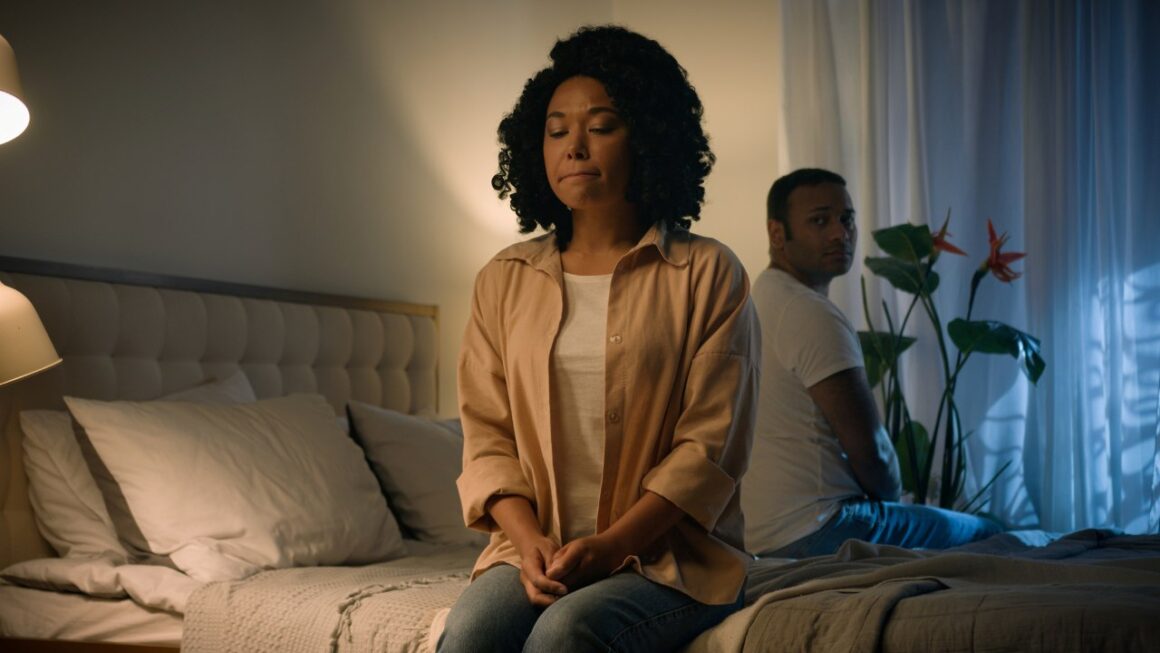Last Updated on 17th September 2025 by Charlie Walsh
There’s a moment – maybe it’s been coming for months, or maybe it hit you like a sucker punch – when you realize something’s wrong. You’re lying next to the woman you love, maybe even touch her out of habit, but nothing happens. Not from her, nor from you. Sex has left the building.
And suddenly you’re trawling the Dead Bedrooms subreddit wondering if this is just your life now.
We’ll be blunt: this isn’t an easy topic. It stirs up everything – rejection, resentment, fear, emotional labour, and how our relationships function. But it’s also a common one, and more importantly, it’s fixable. Not overnight, and not with a magic pill – but with clarity, compassion, and a willingness to do the actual work – on yourself and with your partner.
Here’s what you need to understand – and what you can actually do about it.
Step One: Stop Taking It Personally (Even Though It Feels Personal)
If your wife isn’t initiating or responding to sex, it’s easy to default to dark places. You wonder if she’s not attracted to you anymore. You blame yourself – or worse, blame her. You might even start spiraling into worst-case scenarios: infidelity, the end of the marriage, “this is just how it is now.”
Here’s what we’ll say: it’s not about you… entirely. But it’s not not about you either.
Low desire in women is complex. Hormones, stress, trauma, physical discomfort, sleep deprivation, medications, body image, resentment, parenting fatigue, and relationship disconnection all play a role. It’s rarely just one thing. But don’t mistake her low libido for a character flaw – or a verdict on your desirability. That narrative helps no one – your job now is to get curious, without getting defensive.
Understand What “Desire” Actually Means
A lot of men assume desire is spontaneous – like a lightning bolt that strikes out of nowhere and leads directly to a steamy session. For some people, it works that way. But for many women? Desire is responsive.
That means they don’t necessarily feel turned on until they’re already in a moment of connection or intimacy. If the emotional groundwork isn’t there – if the mental load is crushing, the house is messy, and the kids have been climbing her like a jungle gym all day – then desire won’t show up, no matter how great the sex used to be.
So before you assume the fire’s out, ask: Have we even been setting the stage for a spark to actually catch?
Take an Honest Look at the Relationship (Outside the Bedroom)
Desire doesn’t live in a vacuum; if your wife doesn’t feel emotionally connected, seen, safe, or appreciated? Sex becomes the last thing on her mind.
And this part stings, but it’s essential: you may be contributing to the dead bedroom without realizing it. That doesn’t mean you’re a bad husband, it simply means relationships require maintenance, and desire is one of the first things to evaporate when connection breaks down.
Ask yourself:
- Do we have real conversations, or just trade logistics? “Kids are fed, bills are paid”.
- Do I compliment her? Make her feel wanted outside of sex?
- Do I take initiative with household and emotional labor, or just expect her to carry it all?
- Do I show up for her in ways that have nothing to do with what I want?
What Not To Do (Seriously, Don’t)
- Don’t pressure her. Nothing kills desire faster than feeling obligated. If you keep bringing it up like a complaint or a scoreboard, you’re creating performance anxiety – not intimacy.
- Don’t accuse or guilt-trip. “You never want me anymore” might be your truth, but it’s a dead-end phrase. It puts her on the defensive and shuts down real conversation.
- Don’t retreat into porn or fantasies of escape. It might feel like a release, but it usually deepens the divide. If you’re fully checked out, she will be even more so.
What You Can Do (Without Losing Yourself)
Now to the good part: action. Here’s where things actually start to shift.
1. Start With Empathy, Not Strategy
Before you try “fixing” anything, listen. Sit down and ask her: How are you feeling lately? What’s your relationship to sex right now? Is there anything you need from me emotionally or physically that you’re not getting?
You’re not fishing for guarantees, you’re building trust – and trust is where desire grows.
2. Reconnect Outside the Bedroom
Go on dates, laugh together, do something spontaneous. Take the kids to a sitter and just be in each other’s company without a “goal.” Intimacy can’t thrive in an environment of obligation, it needs freedom, play, and unpredictability.
3. Look Inward (Gently but Honestly)
Are you showing up as the partner you’d want to be with? Are you taking care of yourself physically, emotionally, sexually? Have you let resentment fester? Are you emotionally available, or just physically present?
Sometimes improving the sex life starts with you – not because you’re the problem, but because growth is contagious.
(Also, let’s be real – if you’ve been feeling less confident in the bedroom lately, it might be time to invest in yourself. At bathmatedirect.com, we offer natural, penis-enhancing tools to help you feel like your best, most virile self again.)
4. Talk About Touch (Without Making It About Sex)
Ask what kind of touch she likes – non-sexual and otherwise. Many women pull away from sex because it feels like every touch is a lead-in to something they’re not ready for. Reintroduce affection without expectation: hugs, back rubs, holding hands, even just sitting close on the couch. Let intimacy breathe again.
5. Consider Counseling – Together or Alone
A sex therapist isn’t just for couples in crisis, but can be a space to explore everything from libido issues to trauma to communication breakdowns. Sometimes having a neutral third party changes the entire conversation.
We Asked Women: What Causes a Dead Bedroom, and How to Fix It

“For me, it wasn’t about the sex. It was about the fact that I was doing everything – cleaning, managing the house, keeping the family afloat – and still expected to be ‘into it’ at night. I was emotionally tapped out.”
– Renee, 38
“It felt like sex was just for him. I never had time to warm up, never got asked what I wanted. When I finally said something, he thought I was attacking him. That shut me down more.”
– Maya, 35
“I didn’t lose interest in sex, I lost interest in our marriage. We were roommates who happened to co-parent. It took therapy to realize how disconnected we’d become.”
– Sarah, 42
“What helped us was starting over, quite literally. We stopped trying to ‘fix’ sex and just got curious again – what turned us on at 20 isn’t what works now. Once we gave each other permission to explore, things got fun again.”
– Claire, 45
“Sometimes it’s hormones. I hit perimenopause and my libido vanished. Once I got treatment and we started being more creative – not just penetration-focused – things improved.”
– Jillian, 40
Don’t Just Fix the Sex – Fix the Connection
Your sex life isn’t dead. It’s sleeping. Maybe in a coma. But not beyond resuscitation.
Desire doesn’t thrive under pressure. It needs time, trust, communication, and yes – sometimes a little help. And if it takes longer than you hoped? That’s okay too. You’re not broken. She’s not broken. You’re just human – and connection is a lifelong project.
FAQs: Your Questions, Answered
Yes. And no, that doesn’t mean your marriage is doomed. Libido naturally fluctuates due to stress, hormones, relationship dynamics, mental health, and even seasonal changes. What’s not normal is ignoring the issue and letting resentment build. You’re not alone – and neither is she.
Start from a place of care, not complaint. Use “I” statements instead of “you never…” Try: “I’ve been feeling disconnected from you, and I miss being intimate – can we talk about it?” Timing matters too – don’t spring it on her mid-argument or right before bed.
That’s heavy – but it’s not the end of the road. It might mean she needs medical help (e.g. hormonal issues), therapy, or a completely different kind of intimacy. But if she’s shut down indefinitely with no interest in exploring the “why”? That’s a deeper relationship conversation. Possibly with a professional.
Not necessarily – but shift how you initiate. If she’s feeling pressure or dread every time you touch her, scale it back. Focus on non-sexual intimacy first. Then ask if she’s open to something more. Consent and clarity are sexier than silent expectations.
Yes – but it takes effort on both sides. It’s not about finding a magic middle ground where you’re both equally horny 24/7. It’s about learning each other’s turn-ons, pressures, and emotional needs. Start with our guide on how to deal with mismatched sex drives. Seriously – it’ll help.










